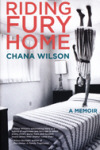Riding Fury Home
“I was the first child ever allowed to visit a patient at the private mental hospital where my mother was being treated. Before our first trip there, Dad said, ‘The doctors think your mother will get better if she can keep seeing you.’” The opening lines of Chana Wilson’s book illuminate the intimate, complex and soul-sucking relationship that she and her mother have throughout their lives, meanwhile plunging the reader into a sparse, transparent glimpse into the lives of women treated in 1950s psych wards. Wilson grows up with her parents as an only child, but at the age of seven, her mother is put into a mental hospital for her severe depression. She attempts to commit suicide numerous times, and the memoir jarringly opens up with the scene of Gloria holding a rifle to her head in the bathroom.
“I was the first child ever allowed to visit a patient at the private mental hospital where my mother was being treated. Before our first trip there, Dad said, ‘The doctors think your mother will get better if she can keep seeing you.’” The opening lines of Chana Wilson’s book illuminate the intimate, complex and soul-sucking relationship that she and her mother have throughout their lives, meanwhile plunging the reader into a sparse, transparent glimpse into the lives of women treated in 1950s psych wards. Wilson grows up with her parents as an only child, but at the age of seven, her mother is put into a mental hospital for her severe depression. She attempts to commit suicide numerous times, and the memoir jarringly opens up with the scene of Gloria holding a rifle to her head in the bathroom.
As a child, Wilson (who was born as “Karen” but as an adult changed her name to the Hebrew name Chana—a subtle indication of her changing sexuality and individuality) interacts with her mother through a mix of words and silence. She learns to love words from her multilingual, bibliophile, opera-loving mother. It is hard to read this book and not feel empathy for both Wilson and her mother, Gloria. Watching Wilson psychologically and physically supporting her ailing mother, when her father takes a job in Europe, is painful and beautiful—a child caring for her mother so completely. And though Wilson expresses anger and, at times even hatred towards Gloria, the effects of the electroshock therapy on her mother (such as wiping out her knowledge of languages beyond English) are sickening.
It is in Wilson’s early adult years—during which she comes out as a lesbian to her mother—that she discovers the root of her mother’s depression. Gloria was having an affair with another married woman, and the treatments and mental hospitals were attempts by Gloria’s own family to eradicate her lesbian tendencies. The two women begin a new relationship, sharing secrets, talking about their lovers, occupying the same space where both are mentally present in a way that couldn’t exist in the confines of Wilson’s childhood. And yet Wilson’s inner turmoil with this new relationship is clearly evoked and considered: “I imagined sobbing in my mother’s arms, but I couldn’t quite let go to this new mother who could now offer solace.” Wilson has to learn how to regress to a natural state of childhood—letting the mother soothe and care. It is a regression that she stumbles through, and perhaps never fully occupies, because her mother soon grows ill (this time with cancer), and Wilson is left to care for her once again.
In the shadows of the pages sit Wilson’s non-relationship with her father, who virtually disappears in parts two and three of the memoir, only to return at the very end, when a sort of reconciliation is reached. Wilson so skillfully evokes empathy for all of her characters—exposing flaws and sadnesses, weaknesses and triumphs—that although we may been angry with her father for leaving Wilson to take care of Gloria, we also feel sorry for his own pain at not having an intimate relationship with his wife and no one to confide in. As he told Wilson during the writing of this book, Gloria had asked him to live as brother and sister. Through this confession, Wilson begins to understand the pain her entire family suffered and reminds us that a tragedy that strikes one member of a family hurts the entire family.
More than a compelling memoir of mother and daughter, Wilson’s narrative depicts a changing political and social climate in America and documents the late 20th century sexual revolution. This book is an essential contribution to American lesbian history, especially to the lesbian radio scene in the San Francisco Bay area. Wilson interviews her mother for a radio show, and through this new medium, the rage and shame she bottled up as a child pour out anew. Yet, as one woman reminds her after the interview broadcasts at a lesbian conference: “If you never do anything else in your life, you have done something by sharing this story.” Wilson’s memoir certainly deserves a place in women’s literary history.
Wilson’s straightforward, clearly written scenes read much like radio programs, which is a nod to the ten years she served as a radio producer and host. In the later years of the memoir, Wilson rushes through scenes, jumping from one year to the next in much the same way she jumps from one lover to the next. The careful pacing and growth of part one and Wilson’s childhood are lost in the later chapters, but I find that the last moments with her sick mother, and her reconciliation with her father, help to counteract the sprint through her adult life. It is rare to say to our parents all that we wish we could say, and yet Wilson reveals that it may indeed be possible, that you can start new relationships with your parents, and that through writing, through art, can you begin to decipher the pain.





